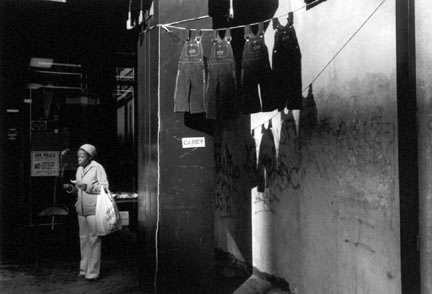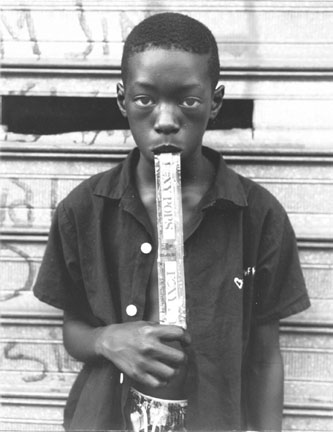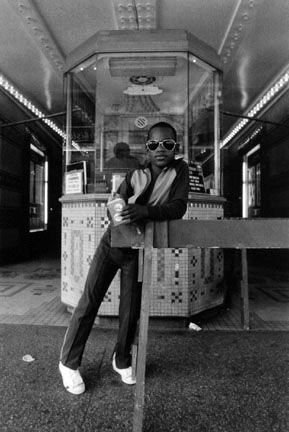

Viewing Record 28 of 208 documentary
About the Photographer
Bey, Dawoud
American, b. 1953
Dawoud Bey's interest in photography was sparked when, at age fifteen, he attended the Metropolitan Museum of Art's exhibition "Harlem On My Mind," which included the work of photographer James VanDerZee. The experience became part of the inspiration for Bey's very first series, "Harlem, USA," begun in 1975. Completed in 1979, the Harlem, USA pictures constituted Bey's first solo exhibition (at the Studio Museum in Harlem) and first publication. He revisited the series in 2005, working from original negatives and vintage prints to produce ten of the original images as a portfolio of carbon pigment prints. The new prints are the same size as those shown in 1979 at the Studio Museum, and this marks their first printing since their original exhibition.
Bey is interested in the portrait as a site of psychological and emotional engagement between the photographer and his model. The multiple panels of Bey's signature style, evident in this 1993 Polaroid triptych, allow him to capture momentary changes in expression, fleeting gestures, and the subtle articulations of personality. Made during his 1993 residency at Columbia College Chicago as part of an educational outreach program organized by the Museum of Contemporary Photography, Bey engaged with Chicago's urban youth through a series of workshops with students at Providence St. Mel School.
In "The Birmingham Project," Bey responds to tragic events in the history of Birmingham, Alabama. On September 15th, 1963 the Ku Klux Klan bombed the 16th Street Baptist Church in Birmingham, Alabama, killing four African American girls. The same day, two African American boys were subsequently killed in an act of racial violence. In 2012, Dawoud Bey created portraits in memory of the tragic and seminal day that became a pivotal point in Civil Rights history, nearing its 50th anniversary. Each diptych features a portrait of a child at the exact age of one killed in 1963 paired with a portrait of an adult at the age the child would be in the year 2013. Bey photographed in two significant places: Bethel Baptist Church, which served as the headquarters for the Alabama Christian Movement for Human Rights (1956-1961), and the Birmingham Museum of Art, where African Americans in the 1960s were only allowed to visit on one day per week, designated “Negro Dayâ€. The images call attention to the injustices of the past while also evoking the lives of the victims could have developed.
Bey's photographs have earned him a variety of fellowships, awards, and commissions. Born in 1953 in Queens, New York, Bey received his BA from Empire State College, State University of New York (1990), and earned his MFA from Yale University, New Haven, Connecticut (1993). His work has been presented in one-person exhibitions at the Addison Gallery of American Art, Phillips Academy, Andover, Massachusetts; Fogg Art Museum, Harvard University, Cambridge, Massachusetts; Light Work, Syracuse, New York; Studio Museum in Harlem, New York; and Walker Art Center, Minneapolis, Minnesota, which toured a mid-career retrospective. Bey's work is also included in the collections of the Bibliothèque Nationale, Paris; The Brooklyn Museum, New York; The Museum of the City of New York; and The Schomburg Center for Research in Black Culture, New York, among other institutions. Bey is a professor of photography at Columbia College Chicago.


